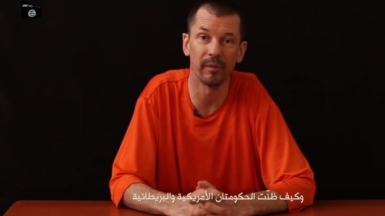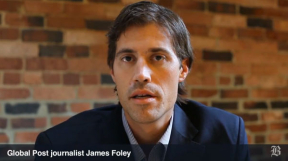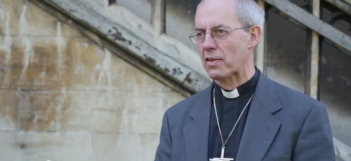
The latest video to be released by Islamic State is markedly different from the brutal videos of beheadings, but serves the same purpose – the glorification of IS and the intimidation of the West.
In the video that appeared on social media yesterday, British photographer and journalist John Cantlie calmly recites a prepared speech in the style of a news report.
He seems to be used as a mouthpiece for IS to address the British public, saying that he has been abandoned by his government and wants to "convey some facts". This is only the first instalment of a series of "programmes" from IS, which, Cantlie says, will tell their side of the story.
"Well it's true I am a prisoner," he says. "That I cannot deny. But seeing as I've been abandoned by my government and my fate now lies in the hands of Islamic State I have nothing to lose. Maybe I will live and maybe I will die, but I want to take this opportunity to convey some facts that you can verify. Facts that if you contemplate might help preserving lives."
IS titled the message 'Lend me your ears' – a quotation from Shakespeare's Julius Caesar, taken from Antony's speech beginning 'Friends, Romans, countrymen...', underscoring that this is a message aimed at the public, rather than addressing national leaders.
By contrast, the three videos that showed the killing of American journalists James Foley and Steven Sotloff and British aid worker David Haines were filmed outside in the desert, and showed a masked IS member with a British accent specifically addressing Barack Obama and David Cameron.
The beheadings, shared around the world and pictured on the front page of most newspapers, are effective, if disgusting, pieces of marketing. IS will be seen as a powerful group that has managed to send ripples of fear across the world, just by killing one man in an orange jumpsuit – three times over.
But this latest video is harder to read. It's not grotesque, but it is calculated. Cantlie speaks in the first person, but is being used to convey a message for his captors.
It is haunting, because the two voices – the terrorist and the terrorised – are fused. No one has a gun to his head as he reads, something that he self-consciously references: "Now I know what you're thinking, you're thinking: 'he's only doing this because he's a prisoner. He's got a gun at his head and he's being forced to do this,' right?"
So will this non-violent video secure support for IS among those who are currently wavering? Perhaps. But since joining a terror group means you have to be willing to accept – and endorse – the violence they inflict, potential recruits are not the primary audience.
Instead, Cantlie addresses "you, the public" in a call to act against the foreign policy decisions of the British and American governments. He compares US and UK policy with the approaches of other countries, who, IS claims, have paid ransoms and have seen their hostages freed, which is set to be expanded in following 'episodes'.
"I'll show you the truth behind what happened when many European citizens were imprisoned and later released by the Islamic State and how the British and American governments thought they could do it differently to every other every other European country," he says. "They negotiated with the Islamic state and got their people home while the British and Americans were left behind."
He promises to unveil truth about the decisions of government that have prompted IS' actions, making comparisons with the "unpopular wars in Afghanistan and Iraq".
In his final appeal to the public, he says: "It's very alarming to see where this is all headed and it looks like history repeating itself yet again. There is time to change this seemingly inevitable sequence of events, but only if you, the public act now."
Though still disturbing, this video is much easier to watch. There were warnings that the Metropolitan police would arrest anyone who watched the Foley murder video, and although this proved unfounded, few will have watched them in full. Sheer curiosity, however, will make the Cantlie video and "programmes" that follow go viral.
The intimidation for British and American leaders this time is not the threat of unending horror films parading torture victims, but of influencing public opinion. Instead of creating widespread fear and disgust that provokes public demands for more air strikes, it could sway people against military action. Public opinion is already divided on the most effective way to tackle IS, and anything that increases the wedge, will make political decision making all the more difficult.




















